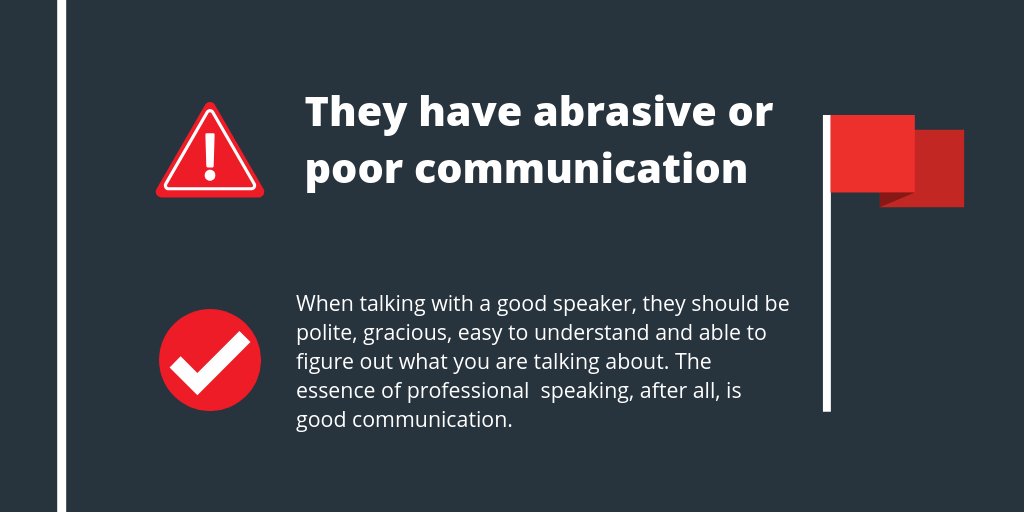8 Red Flags to Watch Out for When Hiring a Professional Speaker

What do college commencements, corporate training weekends, conventions, and many other types of events all have in common?
They hire professional speakers.
There are many reasons to hire a professional speaker — from the need to educate your audience on a new process, product or practice, to the need to provide motivation and inspiration. Or you may simply be looking for some after dinner entertainment for your event.
The type of speaker you hire matters. The best choice for one type of event might be the wrong one for another.
Hiring a good speaker begins with deciding what, exactly, you want.
We have shared with you articles in the past about how to find the right speaker for your event, like “Finding the right type of speaker for your event” “Finding the right speaker for your next event and why research is crucial”. But today we’d like to cover what consistent red flags to watch out for — signs that, whatever type of speaker you are looking for, this one maybe isn’t for you.
It will be your responsibility to do due diligence and keep your eyes open for these red flags in order to ensure the best possible results for your event. And while taking the time to uncover some of these red flags may be a time-consuming ordeal, in the end it will be well worth it to know that you can be confident in your selection of a professional speaker that will do your event justice.
As for tracking the hiring process and organization of candidates, as well as researching their background and references, we suggest utilizing employee tracking or HR software to keep things organized and consistent.
Maintaining a standard operating procedure for hiring candidates will allow you to fairly and accurately assess each prospective speaker in an efficient manner.
Read on to learn more about the red flags you should watch out for when hiring a professional speaker for your next event.
1. Not asking about what you want
As noted, the right speaker is the one who meets your particular needs.
Professional speaking is not a one-size-fits-all proposition.
Good speakers will ask questions about your organization, brand, event and required tone, to more fully understand your goal and desired outcome.
They’ll want to know what your needs are, so they can adjust their talk to match your expectations.
Taking the initiative by providing this information yourself is a good first step, but an approach a lot of seasoned event organizers use is to wait and see if the prospective speaker bothers to ask.
If not, the lack of interest or professional aptitude to know what they need to do to make it a successful event may be one of the biggest red flags of all.
There are many possible reasons why a professional speaker might fail to ask questions about a potential engagement, but none of them are good news for you and your attendees.

2. Problematic politics
Before you hire someone to speak, make sure you know their views on society and politics — even if your event is not directly political.
For example, you wouldn’t want the speaker at your charity fundraiser to make offbeat jokes or reference viewpoints on a politically hot topic that might not be in alignment with you or your company’s core ethics, values and beliefs.
Find out what organizations and causes your prospective speaker is involved with and what kinds of opinions they have expressed in their books and other public statements.
This will give you a better idea of what perspectives they are likely to share during your event, and also how they are likely to be received once people know who you have hired.
All this is not to say that you shouldn’t hire speakers with contrary views or controversial careers. Depending on your event, a contrasting opinion may be exactly what you want. Or a speaker may have valuable things to say despite having perhaps unsuitable associations in other contexts.
The important thing is to know what you are getting into when you choose whom to hire.

3. Not walking their talk
Ideally, you want a speaker who can give you the benefit of their deep and varied experience in their area of expertise.
Most professional speakers can provide just that, and have built their speaking careers on their reputations in some other field.
However, you might encounter speakers who are simply interested in being on stage, without much experience in anything else — a problem more likely, and harder to assess in some areas than others.
For example, is your speaker talking about the positive benefits of living a healthy lifestyle, but is constantly eating at fast food joints and doesn’t set aside time for their physical health?
If you suspect something doesn’t line up, like they are saying one thing but practicing another, they are probably not the right speaker for your event.

4. Poor (or non-existent) reputation
Talk to people who have hired this person before.
Does your prospective speaker:
-
show up on time?
-
arrive rehearsed and prepared?
-
respond graciously to questions?
Or is this person a high-maintenance prima donna who seems like they could be more drama then they are worth?
Established, professional speakers will often have plenty of references and glowing recommendations to show you, but you have no way of knowing whether these represent the typical reaction to their work.
You may want to ask around a bit more. You may be able to find other people in your network who have hired the same speaker.
Ask what the experience was like. Was the speaker engaging? Could you tell they were confident in their knowledge of the topic? Was the speaker genuine and natural or did they come off like a robot spewing out rehearsed lines?
If a speaker has very few past clients to provide as a reference, or no reviews can be found, it may be a red flag that perhaps they aren’t that great a speaker.

5. Mismatched presentation style
There are many ways to speak publicly. One speaker may be funny, rousing, lyrical, informative, while another may be dry enough to dehydrate a cow at 50 paces. And while the majority of audiences might not connect well with the latter style, it could be the perfect fit for your audience.
Or on the flip side, someone who is too jokey, tells too many stories, or is too dramatic, might turn off serious or, say, scientific audiences, many of whom may have a hard time finding value in listening to such a speaker.
The point is that the right speaker has a speaking style that is appropriate for your event.
Someone could have a great reputation and plenty of great expertise, but if they can’t match the mood you want, they’re probably the wrong speaker for you.
That being said, approach the choice with an open mind.
Most people who can make an audience laugh can also make them cry, as exemplified by actors like Robin Williams and Whoopi Goldberg, who made names for themselves in comedy but who could switch to heart-wrenching drama just as well.
There are also people who can approach serious topics, such as cancer, with surprising humor.
The main thing to avoid is a speaker who shows themselves unable to engage with, or meaningfully relate to, your audience.

6. No showreel or available videos
A great way to assess someone’s speaking style is to watch them speak.
An established professional speaker should have plenty of videos showing their work.
If they don’t have video evidence, why don’t they?
Unless yours is the first event they have ever done (which should probably also be considered a red flag), if they have no video footage of their talks, this should have you concerned. Lack of video evidence is a major red flag.
The same goes for other forms of evidence, such as reputation.
If a speaker appears to have recently dropped in from another planet, they’d better be prepared to tell you the name of their spaceship because an unexplained lack of history in the business is a bad sign.

7. Abrasive or poor communication
When you talk to a prospective speaker about your event, is the person polite? Gracious? Easy to understand? Able to figure out what you are talking about?
Someone who is unpleasant to talk to or difficult to communicate with is likely to do poorly on stage as well.
The essence of professional speaking, after all, is good communication.
And whether or not the person can present themselves well on stage, do you really want to deal with someone so unpleasant?
Even an innocent miscommunication can lead to a poor outcome for your event, and anyone willing to disrespect you and your people to your face is also likely to be unreliable in other ways.
Remember that fantastic quote from Maya Angelou: ”When someone shows you who they are, believe them the first time.”
Even if they are a high-status celebrity speaker, they should still be a pleasure to work with.

8. Lack of direction or value
No human being is pointless, but let’s be honest… some talks are.
Even if someone has a great stage presence and a stellar reputation, their talk has to be about something.
There must be a useful take-home message, a clear call to action, or some other kind of central point that is appropriate for your audience and your event.
You’ll be able to see this ability to make a point in any video you see of your prospective speaker, and once they understand the nature of your event and have had some time to prepare, they should be able to succinctly describe the point of their talk and why it is appropriate for your audience.
Someone who can’t explain their point succinctly, or who doesn’t clearly understand the question, might not know what they’re talking about — which means they might not be talking about anything.

Closing thoughts
When searching for red flags, don’t forget to check for the red flags you may be holding yourself.
There are many ways to make a speaker event fail, and at least half of them are in the hands of the organizer, not the speaker.
A professional speaker can’t give you what you want if you don’t know what it is.
Not properly advising the speaker, not thinking clearly about what you want for the event, not providing reliable equipment, or stealing your speaker’s thunder by pre-publishing all their content beforehand can all mess up your event regardless of who your speaker is.
Make sure to hire the right person, and make sure you set yourself up for success by creating the right event and, above all, by knowing what success means for you.
About the Author:
Eric Czerwonka is an entrepreneur, an author at Studyclerk, and co-founder of Buddy Punch, an employee time tracking software company founded in 2013 that provides employee management solutions for any small and large companies alike - anyone with employees from startups right to corporations and anyone with a remote team to manage.






